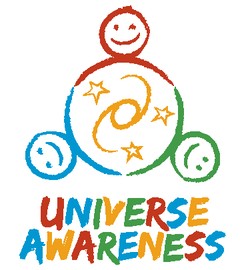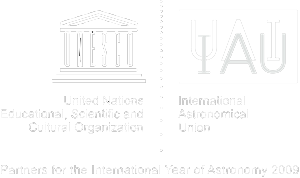The best opportunity to help disadvantaged children have a more equal start in schooling is in their earliest years of life when their brains are developing most rapidly and the basis for their cognitive, social and emotional development is being formed.
(UNICEF, Programming Experiences in Early Child Development, 2006)
UNAWE focuses on disadvantaged children in the specific age group of 4 to 10 years. Early childhood care and education offer the best chance to bettering the lot of underprivileged children.
The data show what proportion of young people are exposed to astronomy at school in European countries (Source: ASTRONET Draft Roadmap, 2007). On top, we show stages in children's development. The orange area is the age range of UNAWE activities.
Universe Awareness targets 4 - 10 year old children because it has an impact on their value system. Traditional science education takes place at older ages where children are not as receptive and keen to learn: they become prone to peer pressure. If children have been exposed to the beauty and scale of the universe from early on, the "coolness" factor of science is not questioned once standard science education starts at school.
The early years are crucial for formation of critical thinking and the creation of a personal and social value system. Development is at its most rapid and the results last a lifetime. Early intervention increases retention and improves a child's chances of continuing her/his education.
The positive effect of early childhood education affects everyone around the children. When you interact with very young children, you interact with their parents and carers. Social cohesion is enhanced.
As children are engaged in UNAWE activities with other children, older or not, they take ownership of the universe and astronomy becomes part of their cultural landscape without being labelled 'science' and bearing the stigma science carries (difficult, elitist, etc.). When they talk to each other on different continents, they make new friends from all over the world before they become aware of differences. This contributes to preventing intolerance.
If parents see that their children enjoy the beauty of the universe and feel it is relevant and part of their culture, astronomy will be part of a society's culture. This re-establishes the connection with the sky all civilisations have, and that is being lost for a number of reasons (urbanisation, migration, etc.). It places astronomy in a context making it relevant to society at all levels, from education to science & technology and culture.
Making astronomy resources that teachers and educators can use without or with minimal training this empowers teachers to teach science and demystifies science as difficult. The human context around the great multicultural endeavor that is astronomy is fundamentally inclusive. Everyone is an astronomer, everyone can be a scientist.
Early childhood care and education is often the responsibility of the family only. Many families in underprivileged environment are not in a position to offer as much to their children as more privileged parents. External intervention often takes the form of immunization or infant nutrition programmes but it is increasingly recognised today that education plays an important part in young children's development.
UNAWE is for the very young because learning begins at birth and it is never too soon to begin investing in children's education.













